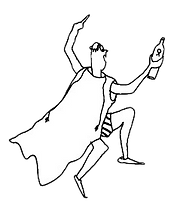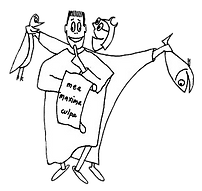SUR LES PLANCHES
Scripts for Amateur French Theatre


Lettres de mon moulin / Letters from My Windmill
d'Alphonse Daudet
English Synopsis
Our narrator, the 19th-century writer Alphonse Daudet, arrives at the old windmill he has rented in Provence, France’s fabled southern region of sun, lavender, rosemary and cicadas. He writes letters to his friend back in Paris, Pierre Gringoire, recording & embellishing local proverbs & tales. All turn out to be variations on an old Catholic theme: temptation, the devil within and the devil without:
-
La chèvre de M. Seguin / Mr. Seguin’s Goat. Blanquette, a restless young goat, longs to experience the freedom and danger of life on the mountain, away from the dull security of M. Seguin’s farm. Once she has managed to escape, she faces courageously the inevitable fatal encounter with the wolf.
-
La mule du Pape / The Pope’s Mule. When the medieval Popes reigned in the happy city of Avignon, Gavotte, the patient, beloved mule of the good pontiff Boniface, suffers the indignities inflicted by a scheming young hypocrite just so long.… Her revenge is delayed seven years but is all the sweeter.
-
Le curé de Cucugnan / The Curate of Cucugnan. Father Martin, the anxious priest of the village of Cucugnan, dreams up a scheme to bring his wayward flock back to the fold. He tells them of his visit to heaven, purgatory and hell in search of the village’s lost souls, how he finds them where you would expect and how he intends to set about “washing the dirty laundry” of his parish.
-
Les trois messes basses / The Three Low Masses. A gluttonous chaplain is seduced by the devil (disguised as his assistant) into racing through the traditional Christmas Eve masses to get to the promised feast. He pays for his sinful haste with eternal damnation.
-
L’élixir du révérend Père Gaucher / Father Gaucher’s Elixir. A dim-witted monk stumbles onto a “spiritual” way to save his abbey from financial ruin, at the possible price of his own soul. Profiting from a reprobate aunt’s recipe for a potent “elixir,” the friars get richer and richer while poor Father Gaucher gets drunker and drunker.
Daudet’s “letters” were first published in Paris in 1869. They count today among France’s most beloved tales, and the five the Comédiens Carolingiens 2000 chose to present are the most celebrated of the collection. The French folk songs chosen to accompany the tales are perhaps even more familiar than the tales, including “Meunier, tu dors / Miller, you have fallen asleep” and “Sur le pont d’Avignon / On the Bridge at Avignon.”
Farcical folk tales
20*
Approx. 1 hour
Minimal (a ladder, a walking stick, a large bowl, a scroll, a quill, wine bottles. Would work well with simple projected backdrops as well. )
As minimally or elaborately stereotypical of Provençal folk culture as desired. (Monks' robes, wings and halo for angel, horns and pitchfork for devil, papal regalia, animal masks and tails.)
* originally played by 6 actors, 3 men, 3 women, but with little regard for traditional gender of roles.
Genre:
# of characters:
Playing time:
Sets/Props:
Costumes:

La mule du pape

Le curé de Cucugnan

La chèvre de M. Seguin

Les trois messes basses
Script
(PDF)
L'élixir du révérend Père Gaucher
Drawings © Allen K. Edens, 2000
Adapted from Daudet's short story collection for (and tailored to) the Comédiens Carolingiens 2000 troupe, the original production included a wandering violinist who played the simple "comptines" that accompany each tale. Original drawings (featured here) for projection and publicity were done by troupe member Allen Edens.